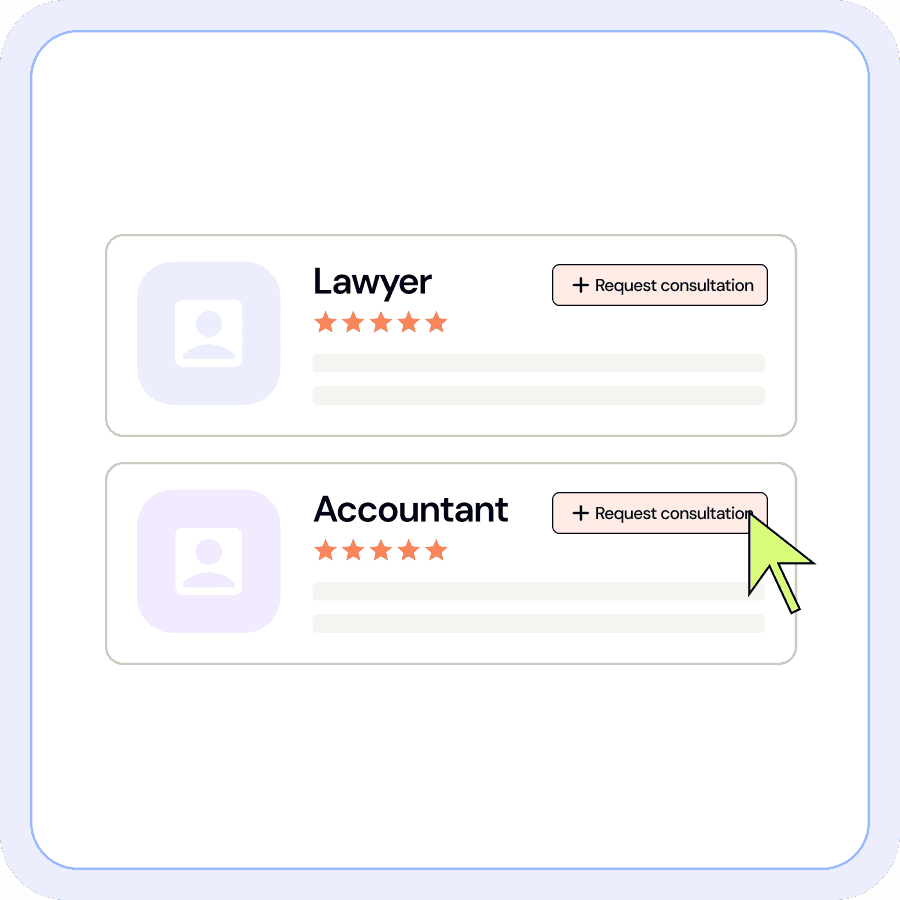Starting a cryptocurrency trading business in Australia can feel like stepping into a maze. It’s exciting, but full of twists, jargon, and regulatory hurdles. Many aspiring entrepreneurs are drawn by the promise of digital assets, only to find themselves tangled in legal requirements, tax obligations, and compliance red tape.
Don’t worry, we’ve got your back! This guide breaks down each step in plain English and shows you how to get your cryptocurrency trading business off the ground in Australia.
We’ll cover what a crypto trading business actually does, crypto business legal requirements, step-by-step setup instructions, common risks, and how platforms like Lawpath can make your journey smoother. Let’s dive in.
Table of Contents
What does a cryptocurrency trading business actually do?
A cryptocurrency trading business is, at its core, a commercial operation focused on buying and selling digital assets, such as Bitcoin, Ethereum, and other cryptocurrencies. The main aim, of course, is to make a profit.
Unlike an individual investor, a business in this space may:
- Actively trade crypto for short-term or long-term gains.
- Engage in arbitrage, buying assets on one exchange and selling them on another to exploit price differences.
- Operate as a broker or exchange, facilitating trades for clients and earning fees or commissions.
- Provide trading-as-a-service, offering tools, advice, or automated trading systems to other traders or businesses.
The business model you choose shapes everything: your legal obligations, the structure of your company, and the type of licensing you’ll need. It’s less about the underlying blockchain tech and more about how you generate revenue by facilitating, executing, or supporting crypto trades.
Is crypto trading legal in Australia?
The short answer is yes, cryptocurrency trading is legal in Australia. However, operating a business in this space is tightly regulated.
The primary regulators are the Australian Securities and Investments Commission (ASIC) and the Australian Transaction Reports and Analysis Centre (AUSTRAC) are the primary regulators.
Let’s look at the key regulatory considerations when you start a crypto company in Australia.
Registration with AUSTRAC
Any business that provides digital currency exchange (DCE) services in Australia must register with the AUSTRAC before commencing operations. This requirement applies to all enterprises exchanging money (Australian or foreign currency) for digital currency, or vice versa.
Cryptocurrency business registration is not optional. Operating without AUSTRAC registration is a criminal offence and can result in severe civil and criminal penalties. AUSTRAC has the authority to refuse, suspend, or cancel a registration if it deems a business to pose an unacceptable risk of money laundering, terrorism financing, or other serious crime.
Licensing requirements
Suppose your cryptocurrency trading business goes beyond basic exchange services, such as providing investment advice, managing client funds, or offering other financial services. In that case, you may also need to obtain an Australian Financial Services (AFS) licence from ASIC.
This licence ensures your business meets stringent standards for financial conduct, disclosure, and consumer protection. It is mandatory for companies offering regulated financial products or services.
Compliance obligations
Registered DCE providers must adhere to strict anti-money laundering (AML) and counter-terrorism financing (CTF) obligations under the Anti-Money Laundering and Counter-Terrorism Financing Act.
Compliance includes Customer Due Diligence (KYC), transaction monitoring, AML/CTF program compliance, and effective recordkeeping.
Taxation of cryptocurrency businesses
The Australian Taxation Office (ATO) treats cryptocurrencies as property for tax purposes. This means that all trades, sales, and income generated by your cryptocurrency trading business are subject to tax reporting and payment.
Depending on your crypto business model, you may be liable for capital gains tax (CGT) or business income tax. Accurate recordkeeping of all transactions, including dates, values, and counterparties, is essential for compliance with tax obligations.
Steps on how to start a cryptocurrency trading business in Australia
Compliance is key for any business, but is particularly strict for cryptocurrency trading. As such, you must follow all of your legal and business obligations to the T when starting out.
1. Decide on your business model and strategy
Before anything else, clarify your business model. Are you:
- A sole trader using personal capital and trading algorithms?
- Setting up a brokerage or exchange, charging fees for facilitating trades?
- Offering crypto trading tools or automated strategies as a service?
Your model will determine your licensing needs, legal structure, and compliance obligations. Drafting a cryptocurrency trading business plan is crucial at this stage; it should outline your target market, revenue model, risk management strategies, and compliance approach.
2. Choose a legal structure and register your business
Selecting the right business structure is vital for liability protection and operational efficiency.
- Sole trader: simple to set up, but you’re personally liable for debts
- Partnership: ideal if you are planning to run the business with someone else
- Proprietary Limited Company (Pty Ltd): offers limited liability, making it the preferred choice for most crypto businesses in Australia
- Trust: used less often, but may suit some collaborative ventures
Once you’ve chosen your structure, register your business and obtain an Australian Business Number (ABN).
Platforms like Lawpath can streamline this process, helping you register your business and secure an ABN quickly and affordably.
3. Register with AUSTRAC (mandatory)
Besides regular business start-up procedures, this is the most critical regulatory step for crypto companies. If you provide digital currency exchange services, you must register with AUSTRAC before you start operating.
Here’s how:
- Prepare your documents: You’ll need details about your business structure, financial statements, and contact information.
- Submit your application: Use the AUSTRAC online portal to enrol and register as a DCE provider. The process includes background checks and an assessment of your AML/CTF program.
- Maintain compliance: AUSTRAC can refuse, suspend, or cancel your registration if you pose an unacceptable risk. Non-compliance can result in heavy penalties or criminal charges.
4. Understand your tax obligations
Crypto trading businesses are subject to Australian tax law. Here’s what you need to keep in mind in terms of taxes.
- Capital Gains Tax (CGT): Applies to profits from selling crypto assets.
- Business income tax: If you’re classified as a trader (operating as a business), your profits are taxed as income, not capital gains.
Remember that you must keep detailed records of all transactions, including dates, amounts, and counterparties. You can use accounting software tailored for crypto or consult a tax professional to ensure compliance and maximise deductions.
5. Put compliance processes in place
To operate legally and securely, your business must implement robust compliance measures.
- KYC: Verify the identity of your clients to prevent fraud and money laundering.
- AML/CTF program: Develop policies and procedures to detect and report suspicious activities. AUSTRAC provides guidelines, but you may need legal advice to tailor your program.
- Secure storage: Protect client and company assets with strong cybersecurity and cold storage solutions.
- Contracts and policies: Draft clear terms and conditions, privacy policies, and service agreements.
Common risks and how to manage them
Running a cryptocurrency trading business in Australia offers exciting opportunities but comes with its own set of unique risks.
Regulatory changes
Cryptocurrency regulation in Australia is evolving rapidly. Regulatory bodies like AUSTRAC and ASIC are increasing their scrutiny, introducing new licensing requirements, and tightening AML and CTF rules. This dynamic environment means businesses must constantly adapt to stay compliant.
Mitigation strategies
- Stay informed: Regularly monitor updates from AUSTRAC, ASIC, and the ATO to keep abreast of regulatory changes.
- Seek legal advice: Engage with legal professionals specialising in crypto regulation to interpret new rules and adjust your business practices accordingly.
- Implement flexible policies: Design your compliance and operational policies to be adaptable, allowing quick updates without disrupting your business.
- Leverage compliance tools: Use AML/CTF software solutions that update automatically to reflect regulatory changes, reducing manual workload and risk of non-compliance.
Platform shutdowns
Cryptocurrency exchanges and trading platforms can be vulnerable to hacks, technical failures, or regulatory shutdowns. Such events can freeze assets, disrupt trading, and damage your business reputation.
Mitigation strategies
- Partner with reputable platforms: Conduct thorough due diligence to select exchanges and service providers registered with AUSTRAC and compliant with AML/CTF laws.
- Diversify platforms: Avoid reliance on a single exchange by spreading assets and trading activities across multiple reputable platforms.
- Develop contingency plans: Prepare protocols for sudden platform outages, including communication strategies and alternative trading options.
- Secure asset storage: Use cold wallets and multi-signature wallets to store assets securely, reducing exposure to exchange vulnerabilities.
Fraud and scams
The crypto sector is a target for fraudsters and scammers exploiting weak verification processes or lax security. This risk threatens both your business and your clients.
Mitigation strategies
- Implement strict KYC procedures: Verify the identity of all customers thoroughly before allowing trading activity, in line with AUSTRAC requirements.
- Develop robust AML programs: Monitor transactions for suspicious patterns and report them promptly to AUSTRAC.
- Educate clients: Provide guidance on recognising scams and encourage safe trading practices.
- Use automated compliance tools: Employ AI-powered AML software to detect fraud attempts and reduce human error.
Asset volatility
Cryptocurrency prices are highly volatile, with rapid price swings that can result in significant financial losses for traders and businesses.
Mitigation strategies
- Adopt risk management strategies: Use stop-loss orders, portfolio diversification, and hedging techniques to limit exposure to sudden market movements.
- Set clear client expectations: Transparently communicate the risks of crypto trading to clients, including the potential for loss.
- Maintain adequate capital reserves: Efficiently manage your business cash flow to withstand market downturns without jeopardising operations.
- Regularly review trading algorithms: If using automated trading, continuously test and update algorithms to adapt to changing market conditions.
By proactively addressing these risks with comprehensive strategies, your cryptocurrency trading business can operate securely, legally, and with greater confidence in Australia’s evolving regulatory landscape.
FAQ
Do I need a crypto business license in Australia?
Yes, if you’re operating a crypto exchange or providing financial services, you must register with AUSTRAC and may need an AFS licence from ASIC.
What are the tax rules for crypto trading businesses?
Crypto trading profits are taxed as business income if you’re classified as a trader, and as capital gains if you’re an investor. Accurate recordkeeping and tax reporting are essential.
Can I run a crypto business as a sole trader?
Yes, you can operate as a sole trader, but most crypto businesses choose a company business structure for better liability protection and credibility.
Can I trade crypto without registering as a business?
If you’re trading as an individual for personal investment, you don’t need to register as a business. But if you’re operating as a business or exchange, registration is mandatory.
How Lawpath can help
Starting a cryptocurrency trading business in Australia is both an exciting opportunity and a serious responsibility. With the right business model, legal structure, and compliance processes, you can build a successful venture in this rapidly evolving space.
Lawpath is an online legal platform designed to support Australian entrepreneurs at every stage of their business journey. For crypto trading businesses, Lawpath offers:
- ABN and company registration: Fast, affordable setup for sole traders, partnerships, or companies.
- Legal document templates: Access to up-to-date contracts, privacy policies, and compliance documents tailored for crypto businesses.
- Compliance tools: Guidance on drafting AML/CTF programs and KYC procedures.
- Expert legal advice: Connect with friendly lawyers who understand the crypto landscape and can help you navigate licensing, tax, and regulatory hurdles.
Start your business on the right foot without compromising on compliance. Get in touch with Lawpath for more details.









